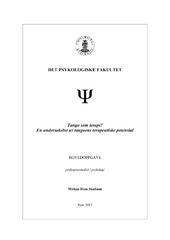| dc.contributor.author | Skotland, Miriam Heen | |
| dc.date.accessioned | 2014-02-11T08:40:46Z | |
| dc.date.available | 2014-02-11T08:40:46Z | |
| dc.date.issued | 2013-11-24 | eng |
| dc.date.submitted | 2013-11-24 | eng |
| dc.identifier.uri | https://hdl.handle.net/1956/7788 | |
| dc.description.abstract | As a popular partner-dance, argentinian tango is practiced in many communities all over the world. In later years, the argentinian tango has also been adopted in the psychiatric field, inspired by other dance related therapies to promote aspects of bodily and psychological functioning. The existing empirical research on health effects of the dance is restricted to issues associated with neurodegenerative-diseases and depression. In spite of this small amount of empirical research, theoretical literature exploring the potentials of this partner-dance when it comes to supporting relational, communicative and emotional processes. Based on a theoretical developmental framework, inspired by both embodied" theories in philosophy (Merleau-Ponty and Johnson) and developmental psychology (such as Stern and Winnicott) connected to neuropsychology, this thesis explores and discusses these potential mechanisms that could support relational, communicative and emotional processes in patients taking part of tango therapy. Elements in embodied, rhythmic interactions, such as synchronization, tuning" and interactional bodily regulation, are suggested to support positive developmental processes involved in affect-regulation and relational communication. | en_US |
| dc.description.abstract | Argentinsk tango som en populær partnerdans, er i dag praktisert i mange samfunn utover dens opprinnelige kontekst. Inspirert av andre danse- og bevegelsesrelaterte terapier, har tango i senere tid blitt brakt inn i det psykiatriske felt. Foreliggende forskning på eventuelle helsebringende effekter av den argentinske tangoen er begrenset til problematikk forbundet med nevro-degenerative sykdommer og depresjon. Til tross for få empiriske studier, finnes teoretisk litteratur som utforsker partnerdansens potensial som terapeutisk aktivitet. I et teoretisk rammeverk inspirert av filosofiske (Merleau-Ponty og Johnson) og psykologiske teorier (som Stern og Winnicott), samt neuropsykologiske innfallsvinkler, der kroppslige erfaringer psykiske utviklingsprosesser blir vektlagt, utforskes- og diskuteres det i denne teksten potensielle mekanismer som støtter relasjonelle, kommunikative og emosjonelle utviklingsprosesser hos pasienter som deltar i tangoterapi. Elementer i den kroppsbaserte", rytmiske interaksjonen som synkronisering, inntoning" og interaksjonell kroppslig regulering, er foreslått å støtte positive utviklingsprosesser involvert i affektregulering og relasjonell kommunikasjon. | en_US |
| dc.format.extent | 324356 bytes | eng |
| dc.format.mimetype | application/pdf | eng |
| dc.language.iso | nob | eng |
| dc.publisher | The University of Bergen | eng |
| dc.subject | Argentinsk tango | eng |
| dc.subject | Terapi | eng |
| dc.subject | Utviklingsprosesser | eng |
| dc.subject | Interaksjon | eng |
| dc.subject | Affektregulering | eng |
| dc.subject | Argentinian tango | eng |
| dc.subject | Therapy | eng |
| dc.subject | Developmental processes | eng |
| dc.subject | Interaction | eng |
| dc.subject | Affect regulation | eng |
| dc.title | Tango som terapi? En undersøkelse av tangoens terapeutiske potensial | eng |
| dc.type | Master thesis | |
| dc.rights.holder | Copyright the author. All rights reserved | |
| dc.description.localcode | PSYK300 | |
| dc.description.localcode | PRPSYK | |
| dc.subject.nus | 736102 | eng |
| fs.subjectcode | PSYK300 | |
